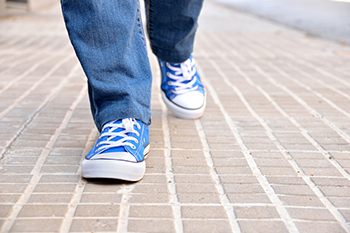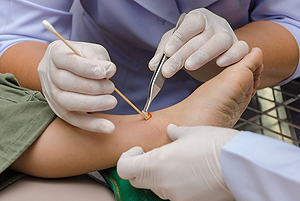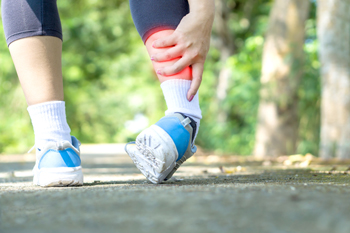Garner (919) 661-4150
July 2021
Why Keeping the Feet Healthy is Important
 The feet are a very complicated part of the body and have 26 bones and hundreds of muscles, ligaments and tendons. Because of this complexity, as well as the fact that the feet support the body, taking care of the feet and keeping them healthy is very important. Common ailments that affect the feet include athlete’s foot, neuromas, bunions, plantar warts, fungal toenail infections, hammertoes, heel spurs, ingrown toenails, and blisters. Diabetic patients are also at an increased risk for developing various foot related problems, particularly ulcers. Because of this, diabetic patients should regularly visit a podiatrist in order to keep their feet healthy. Athletes are also prone to a variety of foot-related injuries, and wearing the proper footwear is very important to keep the feet healthy. If you are dealing with any issues in your feet, a podiatrist will be able to help you fix and maintain your feet to keep them at their healthiest and strongest.
The feet are a very complicated part of the body and have 26 bones and hundreds of muscles, ligaments and tendons. Because of this complexity, as well as the fact that the feet support the body, taking care of the feet and keeping them healthy is very important. Common ailments that affect the feet include athlete’s foot, neuromas, bunions, plantar warts, fungal toenail infections, hammertoes, heel spurs, ingrown toenails, and blisters. Diabetic patients are also at an increased risk for developing various foot related problems, particularly ulcers. Because of this, diabetic patients should regularly visit a podiatrist in order to keep their feet healthy. Athletes are also prone to a variety of foot-related injuries, and wearing the proper footwear is very important to keep the feet healthy. If you are dealing with any issues in your feet, a podiatrist will be able to help you fix and maintain your feet to keep them at their healthiest and strongest.
Everyday foot care is very important to prevent infection and other foot ailments. If you need your feet checked, contact Chukwuma Ukata, DPM from Advanced Carolina Foot and Ankle Center. Our doctor can provide the care you need to keep you pain-free and on your feet.
Everyday Foot Care
Often, people take care of their bodies, face and hair more so than they do for their feet. But the feet are a very important aspect of our bodies, and one that we should pay more attention to. Without our feet, we would not be able to perform most daily tasks.
It is best to check your feet regularly to make sure there are no new bruises or cuts that you may not have noticed before. For dry feet, moisturizer can easily be a remedy and can be applied as often as necessary to the affected areas. Wearing shoes that fit well can also help you maintain good foot health, as well as making it easier to walk and do daily activities without the stress or pain of ill-fitting shoes, high heels, or even flip flops. Wearing clean socks with closed shoes is important to ensure that sweat and bacteria do not accumulate within the shoe. Clean socks help to prevent Athlete’s foot, fungi problems, bad odors, and can absorb sweat.
If you have any questions please feel free to contact our office located in Garner, NC . We offer the newest diagnostic and treatment technologies for all your foot and ankle needs.
Wounds That Don't Heal Need to Be Checked
How Can I Prevent Foot Ulcers?
Diabetic foot ulcers (DFUs) are a common complication of diabetes. These foot wounds are difficult to detect in their early stages and heal slowly and poorly, creating a high risk of infection. Fortunately, it is possible to prevent DFUs. The first step in doing so is to protect your feet. Wear comfortable, well-fitting shoes and avoid walking barefoot, even in the home. Small injuries to the foot can go unnoticed and worsen over time due to the lower limb nerve damage and poor circulation that many diabetics face. Protecting your feet helps to avoid those small injuries. Another important step in preventing DFUs is to inspect the feet daily for any abnormalities, such as cuts, scrapes, sores, discoloration, pain, or strange sensations like tingling and numbness. If you notice anything unusual during a daily inspection, contact a podiatrist as soon as possible. A podiatrist can diagnose and treat foot ulcers before they become too severe.
Wound care is an important part in dealing with diabetes. If you have diabetes and a foot wound or would like more information about wound care for diabetics, consult with Chukwuma Ukata, DPM from Advanced Carolina Foot and Ankle Center. Our doctor will assess your condition and provide you with quality foot and ankle treatment.
What Is Wound Care?
Wound care is the practice of taking proper care of a wound. This can range from the smallest to the largest of wounds. While everyone can benefit from proper wound care, it is much more important for diabetics. Diabetics often suffer from poor blood circulation which causes wounds to heal much slower than they would in a non-diabetic.
What Is the Importance of Wound Care?
While it may not seem apparent with small ulcers on the foot, for diabetics, any size ulcer can become infected. Diabetics often also suffer from neuropathy, or nerve loss. This means they might not even feel when they have an ulcer on their foot. If the wound becomes severely infected, amputation may be necessary. Therefore, it is of the upmost importance to properly care for any and all foot wounds.
How to Care for Wounds
The best way to care for foot wounds is to prevent them. For diabetics, this means daily inspections of the feet for any signs of abnormalities or ulcers. It is also recommended to see a podiatrist several times a year for a foot inspection. If you do have an ulcer, run the wound under water to clear dirt from the wound; then apply antibiotic ointment to the wound and cover with a bandage. Bandages should be changed daily and keeping pressure off the wound is smart. It is advised to see a podiatrist, who can keep an eye on it.
If you have any questions, please feel free to contact our office located in Garner, NC . We offer the newest diagnostic and treatment technologies for all your foot care needs.
How Obesity Affects Your Feet
Maintaining a healthy weight is essential to your well being, which includes your foot and ankle health. People who are obese are more likely to develop foot pain than those with healthy body weights. Heavier individuals are more prone to flat feet, decreased range of motion, and they also put more pressure on the soles of their feet. All of this can put excess stress on the foot’s tissue and bone structures. Obesity increases an individual’s risk of plantar fasciitis, hammertoes, bunions, and can increase their chances of developing systemic diseases which negatively affect the feet, like diabetes and gout. A podiatrist has a variety of methods to help ease the pressure of excess weight on the feet, including guidance on proper footwear and creating custom orthotics to more evenly distribute weight, support the arch, and relieve pressure points.
Obesity has become very problematic at this point in time and can have extremely negative effects on the feet. If you’re an obese individual and are concerned about your feet, contact Chukwuma Ukata, DPM from Advanced Carolina Foot and Ankle Center. Our doctor can provide the care you need to keep you pain-free and on your feet.
Obesity and Your Feet
Since your feet are what support your entire weight when standing, any additional weight can result in pain and swelling. Being overweight is one of the main contributors to foot complications.
Problems & Complications
Extra Weight – Even putting on just a few extra pounds could create serious complications for your feet. As your weight increases, your balance and body will shift, creating new stresses on your feet. This uneven weight distribution can cause pain, even while doing the simplest tasks, such as walking.
Diabetes – People who are overweight are at serious risk of developing type-2 diabetes, which has a drastic impact on the health of your feet. As you get older, your diabetes might worsen, which could lead to loss of feeling in your feet, sores, and bruises. You could also become more prone to various infections.
Plantar fasciitis – Pressure and stress that is placed on muscles, joints, and tendons can trigger plantar fasciitis, which is an inflammation of tissue that forms along the bottom of the foot.
If you have any questions please feel free to contact our office located in Garner, NC . We offer the newest diagnostic and treatment technologies for all your foot and ankle needs.
Practical Tips for Preventing Running Injuries
As a runner, taking good care of your feet can help you perform at peak levels while reducing your risks of injury. First and foremost, choose the right running shoes. Get fitted by a professional, and take into consideration your style of running, fitness goals, and the type of terrain you’ll be running on. Get your feet used to new shoes by wearing them around the house first. Wear moisture-wicking socks to keep feet dry and to avoid athlete’s foot and blisters—which can also be prevented by applying petroleum jelly or body glide on areas of friction. Reduce swelling and help your feet and muscles recover by icing and massaging your feet. Keep your toenails trimmed at the right length and straight across to avoid bruised or ingrown toenails. Do strengthening exercises to build up muscles in your feet. For more tips on avoiding running injuries, strengthening foot muscles, and choosing the right shoe for your feet, consult with a podiatrist.
All runners should take extra precaution when trying to avoid injury. If you have any concerns about your feet, contact Chukwuma Ukata, DPM of Advanced Carolina Foot and Ankle Center. Our doctor will treat your foot and ankle needs.
How to Prevent Running Injuries
There are a lot of mistakes a runner can make prior to a workout that can induce injury. A lot of athletes tend to overstretch before running, instead of saving those workouts for a post-run routine. Deep lunges and hand-to-toe hamstring pulls should be performed after a workout instead of during a warmup. Another common mistake is jumping into an intense routine before your body is physically prepared for it. You should try to ease your way into long-distance running instead of forcing yourself to rush into it.
More Tips for Preventing Injury
- Incorporate Strength Training into Workouts - This will help improve the body’s overall athleticism
- Improve and Maintain Your Flexibility – Stretching everyday will help improve overall performance
- “Warm Up” Before Running and “Cool Down” Afterward – A warm up of 5-10 minutes helps get rid of lactic acid in the muscles and prevents delayed muscle soreness
- Cross-Training is Crucial
- Wear Proper Running Shoes
- Have a Formal Gait Analysis – Poor biomechanics can easily cause injury
If you have any questions, please feel free to contact our office located in Garner, NC . We offer the newest diagnostic and treatment technologies for all your foot care needs.










